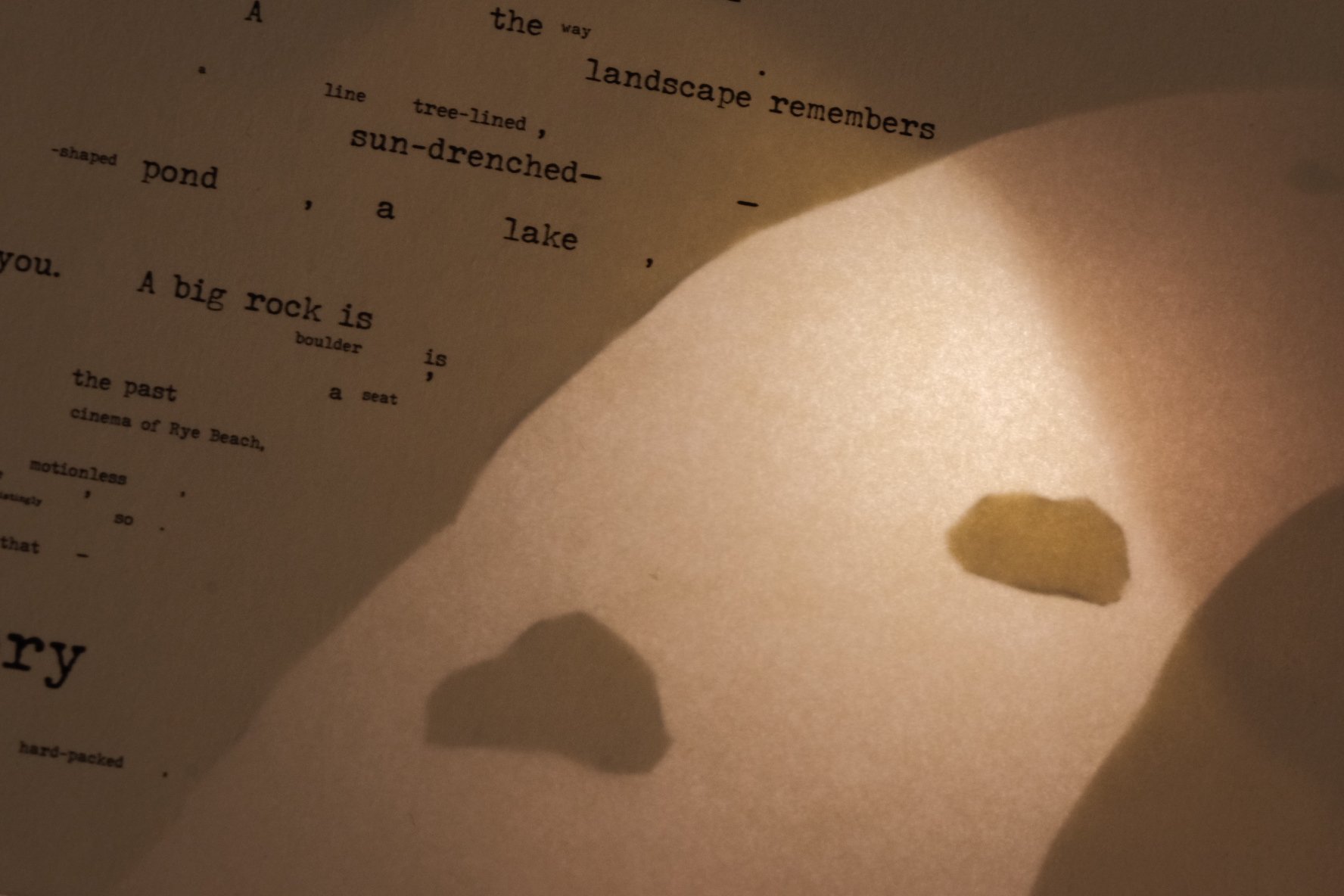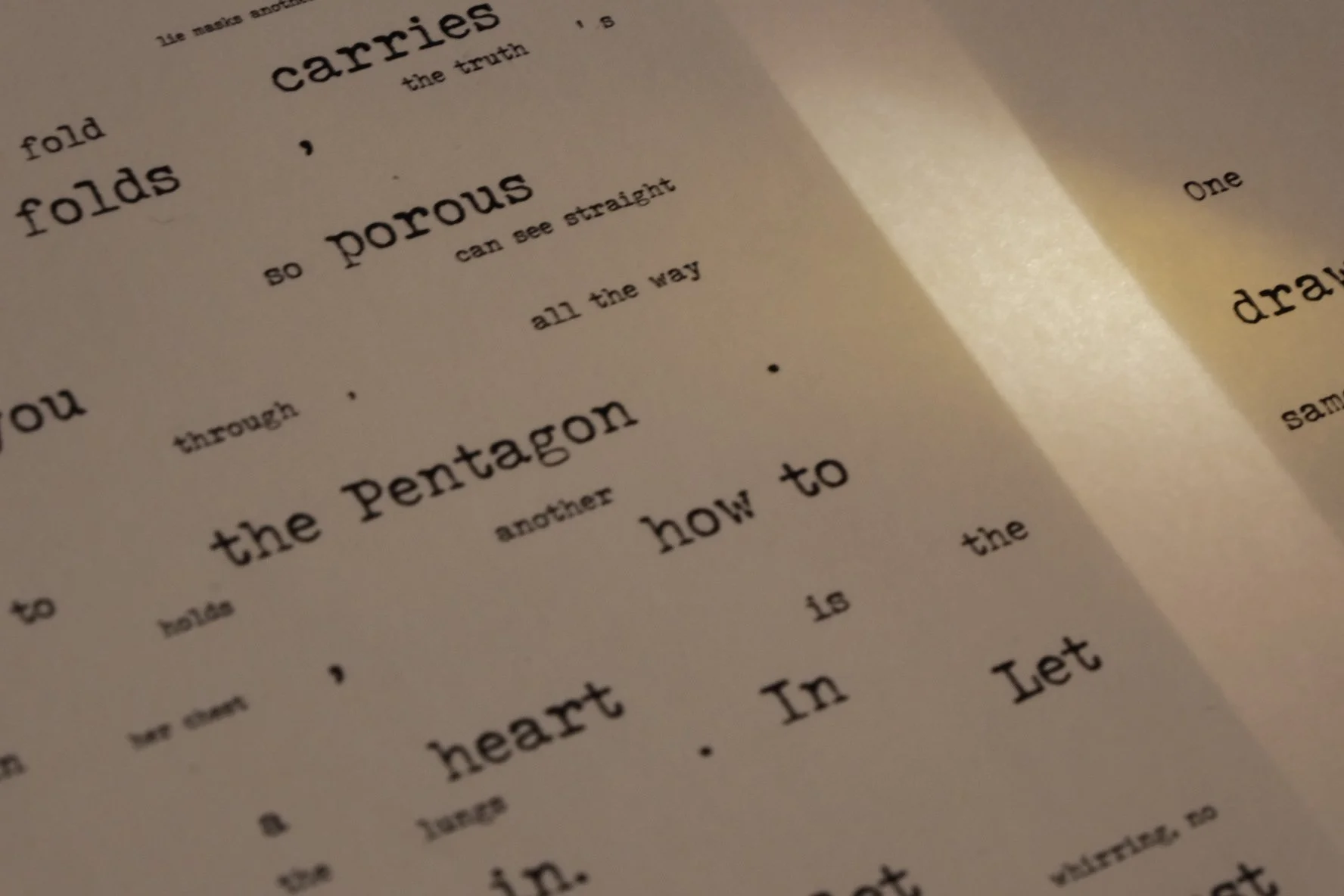Artist’s Book for Elaine Sexton
This is an artist’s book that I created for American poet Elaine Sexton.
Reading all of Elaine’s poems, I found that she is good at spotting subtle things in daily life that most people overlook. From the carved “INKHEAD” on the window by the blade, to the dirt on the road, the air, the rock, the porous fabric, the salted water, the frozen reeds, and the buzz in the grass, to every sensitive and imperceptible emotional feeling. At first, I didn’t understand what she was saying, but the more I read, the more I can picture the scene she was describing. She weaves these minute details into a vibrant and lively scene.
The Theme
From my understanding of Elaine’s poems, the theme of my artist’s book is “Imperceptive”. I picked 5 poems from Elaine Sexton: Inkhead, Dirt Road, Fatigue, Small Points, and As it is. These 5 poems all suit the concept of imperception.
Opening the clips, you will see the title of the whole book “INKHEAD”. And there are several different panels after. You can see the book concept at the back of the cover.
How imperceptive?
If you read this book in a normal environment, there is nothing special. But if you are in a dark environment and shine a light behind each piece of the panel, you will find a different picture.
01 - Inkhead
Carved in glass with a pocket knife––
I N K H E A D
While the conductor collects tickets
in other cars I am a blade––
my forehead, my chin, the bridge
of my nose, my cheek bones
my lips, the crack between my eye-
brows –– a flash, a backdrop
that is field, cloud, air anchored
by powerlines
only to be blown away
and replaced by rain
smearing my name.
Honestly,
the process of discovery
is slow. Presently
I am invisible,
a rail-rider unresolved,
oedipal. I pitch forward. Drawing
while thinking––
how ink spends itself
leaving,
left.
02 - Dirt Road
Today I am missing
a dirt road, dry, almost white almost
dust in this heat. In art
it takes a road
to get to a waterfall.
In the poem
I let the cars pass, slow,
and sometimes
not at all. Summer
remembers the way.
A landscape remembers
a line tree-lined,
sun-drenched––
wedged-shaped
pond, a lake, an ocean,
you. A big rock is a boulder, is a seat
to the past cinema of Rye Beach,
New Hampshire,
motionless,
excruciatingly so.
Memory is like that––
hard-packed,
sand.
03 - Fatigue
One lie masks another,
one fold carries a field
of folds, the truth’s fine
fabric, so porous
you can see straight
through, all the way
to the Pentagon. One shield
holds another
in her chest, how to draw
a heart is the same
as the lungs. In,
out, in. Let the pulmonologist
rests, let her head stay
silent. No whirring, no
pumps, no prayers, just
rest.
04 - Small Points
Naturally, something that calls itself small
wants little to do with attention. Geography
called small is a quiet gush of light, tides
that pool in small sand-banked reservoirs,
and discreet stands of pines, the trees
not small, but their conversations are.
Hush of seals, their heads rise out of small
waves to gaze at each other and walkers
on the beach. Small snaps of seaweed,
and here on this slender (small) point
of stone and sand, a peninsula, almost silent
but for small bird calls. And you, present
in your skin, and your skin, dry, and
the wind, dry, small. And you, John Marin,
driving small points in long strokes, water
in your paint, the sea in your here, now.
on John Marin’s “Small Point, Maine”
05 - As it is
As it is
happening, as the dog
you adore is alive
in his chew, snout
in the air, as the oyster is alive in your sea
sour mouth as the sail is gust, is open,
is full, the spit of a wave is alive
on your face, this white cap of a sunset
is hours away, as is the fade of the buzz
in the grass not coming back,
the breakwater is
still granite is still weight bearing,
your mother is still alive
in what you can’t you step on
slip over, you, awake, in
the comb of, the twist of
the bread of,
the lash on
the lid
of
this
this
this.


















